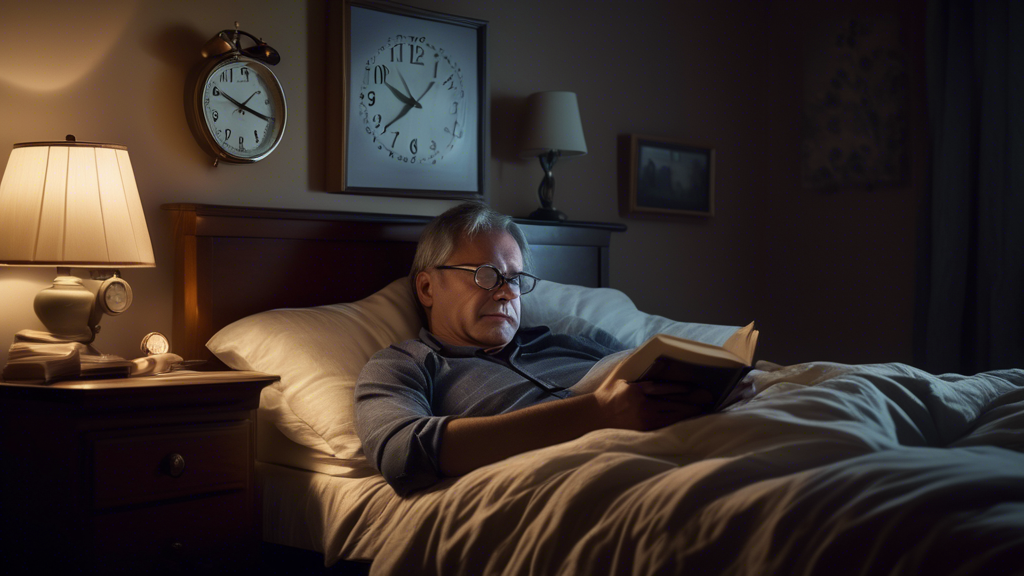Understanding the Sleep Cycle Changes in Mature Men
Sleep is a vital component of overall well-being, playing a critical role in physical health, mental clarity, and emotional stability. As men age, they often experience notable changes in their sleep cycles, which can significantly impact their quality of life. Understanding these sleep cycle changes is particularly important for mature men, as it can help address sleep-related issues that may arise due to aging. Mature men frequently face alterations in sleep duration and quality, largely influenced by hormonal shifts, lifestyle habits, and common age-related sleep disorders such as sleep apnea and insomnia. Recognizing and addressing these changes can lead to improved sleep quality and overall health. This article delves into the intricacies of sleep cycle changes in mature men, exploring the common issues they face and offering practical strategies to enhance their sleep and, consequently, their life.
Introduction to Sleep Cycles in Mature Men
Sleep cycles are an essential aspect of overall health, involving various stages that our bodies go through to achieve restorative rest. Understanding these cycles is important for maintaining good health, especially as we age. Sleep is not just a passive activity; it’s an active process where our brains go through distinct stages, including light sleep, deep sleep, and REM (Rapid Eye Movement) sleep. Each of these stages plays a crucial role in different aspects of health, such as memory consolidation, physical healing, and emotional regulation.
With aging, particularly in mature men, changes in sleep cycles become more pronounced. These alterations can significantly impact daily life and overall well-being. It is crucial to understand these changes to manage health effectively and improve quality of life. Sleep disturbances and disorders can lead to various health issues, including cardiovascular problems, decreased cognitive function, and weakened immune response.
Why focus specifically on mature men? As men age, physiological and hormonal changes uniquely affect their sleep patterns. Testosterone levels, which play a role in regulating sleep, begin to decline around middle age. This decrease can lead to changes in sleep architecture, contributing to difficulties in falling and staying asleep. Additionally, mature men are more susceptible to certain sleep disorders, such as sleep apnea and restless legs syndrome, further complicating their sleep cycles.
Moreover, societal roles and lifestyle factors often shift significantly for men as they mature. Retirement, changes in physical activity levels, and increased stress related to health or family can create a perfect storm for sleep difficulties. Understanding these elements allows for better management and intervention, helping mature men maintain optimal health and vitality.
Overall, a comprehensive understanding of sleep cycles and the specific changes experienced by mature men is vital. Awareness and proactive management can lead to better health outcomes, increased energy levels, and improved mental and emotional well-being.

Common Sleep Cycle Changes in Mature Men
As men age, their sleep patterns often undergo notable transformations. One of the primary changes experienced by mature men is a shift in sleep duration and quality. Many men find that they wake up earlier than they used to, despite going to bed at the same time. This alteration in sleep duration can result in shorter sleep periods overall.
Additionally, sleep quality may deteriorate with age. Mature men might find themselves waking up more frequently during the night and experiencing less deep sleep. This reduction in deep sleep, also known as slow-wave sleep, can affect overall restfulness and recuperation. It’s important to note that while these changes are common, they can vary significantly from person to person.
Another significant factor influencing sleep cycles in mature men is hormonal fluctuations. As testosterone levels decline with age, this can have a profound impact on sleep patterns. Lower testosterone levels are associated with increased occurrences of fragmented sleep and reduced sleep efficiency. Furthermore, the decrease in the production of growth hormone can contribute to the decline of deep sleep phases, exacerbating feelings of tiredness and fatigue during waking hours.
The role of lifestyle factors cannot be overlooked when considering sleep cycle changes in mature men. Dietary habits play an essential role in sleep quality. For instance, consuming heavy meals or caffeine close to bedtime can disrupt sleep. Regular exercise, on the other hand, is known to promote better sleep, but excessive physical activity or exercising too close to bedtime can have the opposite effect.
Stress is another lifestyle factor that significantly affects sleep patterns. The pressures of daily life, coupled with responsibilities and concerns that often increase with age, can lead to heightened stress levels, making it more difficult to fall and stay asleep. Practicing stress management techniques, such as mindfulness or meditation, can be beneficial in mitigating these effects.
Moreover, certain medical conditions and medications that are more prevalent in older age can interfere with sleep. For instance, chronic pain or side effects from prescription drugs can disrupt sleep cycles, leading to increased wakefulness or changing sleep architecture.
Mature men are also prone to common sleep disorders that can disrupt sleep cycles. Sleep apnea, a condition characterized by paused or shallow breathing during sleep, is particularly common. This disorder can cause frequent awakenings throughout the night, leading to poor sleep quality and daytime fatigue. Risk factors for sleep apnea include obesity, smoking, and underlying health conditions such as hypertension.
Insomnia is another prevalent sleep disorder among mature men. This condition manifests as difficulty in falling asleep, staying asleep, or waking up too early. Insomnia can be triggered by various factors, including stress, anxiety, depression, and medical conditions such as chronic pain or respiratory issues. It is crucial to identify and address the underlying causes of insomnia to improve sleep quality.
Furthermore, restless legs syndrome (RLS) and periodic limb movement disorder (PLMD) can also disrupt sleep cycles in mature men. RLS is characterized by an uncontrollable urge to move the legs, often accompanied by uncomfortable sensations. PLMD involves involuntary limb movements during sleep, which can lead to frequent awakenings and poor sleep quality.
In summary, there are various factors contributing to sleep cycle changes in mature men, ranging from hormonal fluctuations and lifestyle habits to common sleep disorders. Understanding these changes and their underlying causes is essential for taking effective steps towards improving sleep quality and overall well-being.

Strategies to Improve Sleep Quality for Mature Men
Tips for Maintaining a Healthy Sleep Routine
Maintaining a consistent sleep routine is crucial for mature men aiming to improve the quality of their sleep. The body’s internal clock, or circadian rhythm, greatly benefits from regular sleep patterns. One effective strategy is to set a specific bedtime and wake-up time every day, even on weekends. This helps regulate the circadian rhythm, making it easier to fall asleep and wake up naturally.
Creating a bedtime routine can also enhance sleep quality. Activities such as reading a book, taking a warm bath, or practicing relaxation techniques like deep breathing or meditation can signal to the body that it is time to wind down. Avoiding screens (such as phones, tablets, and TVs) an hour before bed is also recommended, as the blue light emitted by these devices can disrupt melatonin production, a hormone essential for sleep.
Recommended Lifestyle Changes to Enhance Sleep
Diet and exercise play pivotal roles in sleep quality. For mature men, a balanced diet rich in fruits, vegetables, lean proteins, and whole grains can improve overall health, which in turn can positively affect sleep. It’s advisable to avoid heavy meals, caffeine, and alcohol close to bedtime. Caffeine and alcohol are known to disrupt sleep patterns and should be consumed in moderation, particularly in the hours leading up to sleep.
Regular physical activity has been shown to promote better sleep. Engaging in at least 30 minutes of moderate exercise on most days can help mature men fall asleep faster and enjoy deeper sleep. However, exercising too close to bedtime can be counterproductive, as it may increase energy levels and body temperature. Therefore, it’s best to complete workouts at least three hours before going to bed.
Medical and Therapeutic Interventions
When lifestyle changes are not enough, mature men may benefit from medical and therapeutic interventions to improve their sleep quality. Medications such as prescription sleep aids or melatonin supplements can be effective under the guidance of a healthcare provider. However, these should not be viewed as long-term solutions due to potential side effects and the risk of dependency.
Cognitive Behavioral Therapy for Insomnia (CBT-I) is a highly recommended non-pharmacological treatment. CBT-I focuses on changing the thoughts and behaviors that cause or worsen sleep problems. It has been shown to be very effective and can be a long-term solution for improving sleep quality without the risks associated with medications.
Importance of Consulting Healthcare Providers for Persistent Problems
Persistent sleep issues should not be ignored, as they can significantly impact overall health and well-being. Mature men experiencing chronic sleep problems should consult a healthcare provider to identify any underlying causes. Sleep disorders such as sleep apnea or restless leg syndrome require medical diagnosis and treatment.
Healthcare providers can offer personalized advice and treatment options based on individual health profiles. This may include sleep studies, where the patient’s sleep is monitored overnight to identify any abnormalities. Addressing chronic sleep issues through professional advice can lead to better long-term health outcomes and an improved quality of life.
In summary, improving sleep quality for mature men involves a combination of maintaining a healthy sleep routine, implementing beneficial lifestyle changes, and seeking medical or therapeutic help when needed. These strategies can contribute to better sleep and overall health.
In conclusion, understanding the changes in sleep cycles among mature men is crucial for promoting overall health and well-being. As men age, they often experience noticeable shifts in their sleep patterns, including alterations in sleep duration and quality. These changes can be attributed to a variety of factors, such as hormonal fluctuations, lifestyle habits, and the onset of common sleep disorders like sleep apnea and insomnia. Recognizing these patterns can help in identifying potential health issues early on and taking appropriate measures to address them.
To improve sleep quality, mature men can adopt several strategies. Establishing a consistent sleep routine, incorporating regular exercise, and maintaining a balanced diet play significant roles in promoting better sleep. Additionally, managing stress through relaxation techniques such as meditation or deep breathing can further enhance sleep quality. For those experiencing persistent sleep issues, medical and therapeutic interventions may be necessary. Consulting healthcare providers can offer personalized solutions and treatments to alleviate sleep problems.
In sum, being proactive about sleep health and making informed lifestyle changes are vital for mature men to maintain both physical and mental health. By understanding the intricacies of sleep cycle changes and implementing effective strategies, mature men can significantly improve their quality of sleep and, consequently, their overall quality of life.

